|
|
|
Sort Order |
|
|
|
Items / Page
|
|
|
|
|
|
|
| Srl | Item |
| 1 |
ID:
058965


|
|
|
| 2 |
ID:
036546


|
|
|
|
|
| Publication |
London, Routledge, 1989.
|
| Description |
x, 288p.
|
| Standard Number |
0415009235
|
|
|
|
|
|
|
|
|
|
|
|
Copies: C:1/I:0,R:0,Q:0
Circulation
| Accession# | Call# | Current Location | Status | Policy | Location |
| 030890 | 355.26/HAG 030890 | Main | On Shelf | General | |
|
|
|
|
| 3 |
ID:
085136
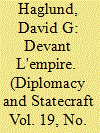

|
|
|
|
|
| Publication |
2008.
|
| Summary/Abstract |
Many observers of contemporary French politics would find it difficult to resist the temptation to conclude that France, alone among the European allies of the United States, has consistently had the greatest difficulty in adjusting to the reality of America's power. When that power occasions, as it frequently does, debates about "American empire," French opposition to American influence seems to become even more pronounced. In fact, there has in recent decades been a distinctive French negative assessment of the merits of American empire, but it would be a mistake, or so this paper argues, to assume that French interests have invariably been at odds either with American power or with American empire. Using four eponymous figures to illustrate the French perspective on American empire in the past 100 years, this essay highlights how and why that assessment has evolved.
|
|
|
|
|
|
|
|
|
|
|
|
|
|
|
|
| 4 |
ID:
074410
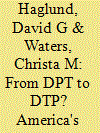

|
|
|
|
|
| Publication |
2005.
|
| Summary/Abstract |
This article asks whether the differing manner in which liberal-democratic allies perceive security threats might prove corrosive to their alliance. In effect, the authors seek to test the assumption that 'democratic alliances' and liberal-democratic security communities are virtually indestructible so long as the members remain liberal democracies. The case chosen for diachronic analysis is the collapse of Anglo-American-French comity in the immediate aftermath of the liberal-democratic allies' victory in the First World War. Argued here is that differential threat perception (or DTP) contributed significantly to the ending of meaningful security cooperation among the group. In this sense, DTP seems to have weakened the conceptual underpinning of the democratic alliance implied by democratic peace theory (or DPT).
|
|
|
|
|
|
|
|
|
|
|
|
|
|
|
|
| 5 |
ID:
084641


|
|
|
|
|
| Publication |
2008.
|
| Summary/Abstract |
There has been much controversy over the role that ethnic diasporas (sometimes called "lobbies") do or should play in shaping American foreign policy. This article looks at one particular ethnic group, American Jews, with a view to assessing the claim made by some authors, to the effect that "neoconservatism" has been influenced considerably by Judaism. The article mostly debunks that claim, at least if the suggestion is that something about Judaism as a religion can help account for the policy agendas espoused by neoconservatives in recent years. However, the authors do argue that a "geo-ethnic" link can be established between a Jewish diaspora in America and the evolution of neoconservatism. Their claim is that a "borderlands" tradition emanating originally on the Russian frontier in the latter part of the nineteenth century was exported to America, through the migration of peoples they refer to as "new borderers." This folk community, the authors argue, coalesced with another, well-established, folk community of "borderers" (the Scotch-Irish), resulting in the formation of the coalition known in recent years as neoconservatism - a coalition representing a fusion of Jacksonianism and Wilsonianism.
|
|
|
|
|
|
|
|
|
|
|
|
|
|
|
|
| 6 |
ID:
178198


|
|
|
|
|
| Summary/Abstract |
“Strategic culture” is one of those conceptual bridges that link history with political science because, among other reasons, it reminds us of the hold that memories of past events can continue to exercise upon contemporary reality. But those memories are always subjective, sometimes downplayed to the point of nearly being forgotten altogether, at other times so overstated as to yield a highly distorted sense of the past and of its relationship to the present. This article constitutes a revisitation of contemporary Quebec strategic culture, from the perspective of historical memory. That strategic culture has of late been so strongly stamped with the impress of a “Pearsonian internationalism” that it becomes easy for analysts to confuse it with “pacifism.” Yet it has also been a strategic culture that stems from a great deal of historical amnesia. What has been effaced from the collective memory is the long period in which war was endemic in New France—the period that gives the lie to the notion of Quebeckers somehow being a “pacifistic” folk. This was the sanguinary era upon which the historian Francis Parkman focused such a large share of his prodigious intellectual energies. Only the closing act of this era seems to have escaped erasure from Quebec’s collective memory. Indeed, that act, which took place on the Plains of Abraham, has been “remembered” only too well. So well has it been recollected, in fact, that it has fostered within Quebec society the unshakable conviction that, for Quebeckers, war must always be a risky undertaking susceptible of leading to catastrophe.
|
|
|
|
|
|
|
|
|
|
|
|
|
|
|
|
| 7 |
ID:
052220


|
|
|
| 8 |
ID:
193542
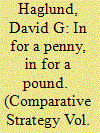

|
|
|
|
|
| Summary/Abstract |
Over the past couple of decades, students of American grand strategy have debated the merits (or lack thereof) of an orientation toward the global balance of power that has come to be known as “offshore balancing.” Its critics hold offshore balancing simply to be another way of expressing the dangerous allure of strategic “restraint,” or even “isolationism.” Its enthusiasts, by contrast, see in it nothing other than the best conceivable grand strategy for America, enabling Washington to avoid the pitfalls of either too little or too much interventionism in global affairs. This article challenges both positions, and argues that the historical record of offshore balancing as an American strategic orientation leads to the conclusion that, far from being a crypto-isolationist grand strategy, it actually betrays close affinities with the so-called “maximalism” to which its champions believe it to be superior.
|
|
|
|
|
|
|
|
|
|
|
|
|
|
|
|
| 9 |
ID:
121226
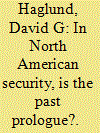

|
|
|
|
|
| Publication |
2012.
|
| Summary/Abstract |
There is nothing unusual about positing security issues as "problems"; after
all, it was not so terribly long ago that the central dilemma in international
security regularly, and not incorrectly, bore the label, the "German Problem"
(in some variants, the "German Question").1
I have myself, on occasion,
even employed the concept of problem to frame discussions of historical
and contemporary policy dilemmas associated with aspects of North
American security-albeit on the understanding that somehow the source
of the contention inhered in actions or perceptions linked to American
policymakers, the assumption being that it was Canadians who were left
facing the "problem" in question.
|
|
|
|
|
|
|
|
|
|
|
|
|
|
|
|
| 10 |
ID:
083800
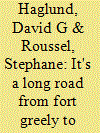

|
|
|
|
|
| Publication |
2008.
|
| Summary/Abstract |
Alone among America's Western allies, Canada seems to have had the most difficulty adjusting to the idea that America was deploying a limited missile defense system in North America. Within Canada, one province in particular has seen a near-consensus develop against missile defense. That province is Quebec, where the system has been routinely criticized as being fraught with unspecified peril for Quebec and Canadian interests. Yet within the ranks of Quecec sovereigntists who have been most critical of missile defense, there are many who insist that an independent Qubec would play a part in the Western world's current alliance and other security structures, NATO and NORAD in particular. Joining the latter, however, would pose a major contradiction for sovereigntists, given NORAD's role in missile defense. This article describes and analyzes this instance of "strategic doublethink
|
|
|
|
|
|
|
|
|
|
|
|
|
|
|
|
| 11 |
ID:
108775
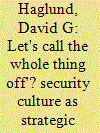

|
|
|
|
|
| Publication |
2011.
|
| Summary/Abstract |
Scholars interested in contemporary security and defence policy, in Europe as elsewhere, often seek refuge in conceptual havens, and the articles in this special issue are no exceptions. One of those sheltering spots has been dubbed security culture, while another fashionable resting place carries the label, 'strategic culture'. This article argues that attempts to draw a distinction between the two categories are superfluous, not to say meaningless, and that insofar as what we should call our concept, it really is a case of Tweedledum and Tweedledee. More important is the task of attempting to abstract policy significance from the complexity and definitional vagueness of the more 'senior' of the two concepts, namely strategic culture. This complexity and vagueness to the contrary notwithstanding, this article claims that strategic culture can be of some analytical use in highlighting the ways in which both context and character have played, and continue to play, a part in shaping states' orientation toward security and defence policy.
|
|
|
|
|
|
|
|
|
|
|
|
|
|
|
|
| 12 |
ID:
061203
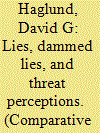

|
|
|
|
|
| Publication |
Jan-Mar 2005.
|
|
|
|
|
|
|
|
|
|
|
|
|
|
|
|
| 13 |
ID:
155581


|
|
|
|
|
| Summary/Abstract |
DAVID G. HAGLUND, MARCO CLEMENTI, and ANDREA LOCATELLI reflect on analogies drawn between President Donald Trump and two Italian counterparts: Benito Mussolini and Silvio Berlusconi. They conclude that while the former is widely off the mark, the latter provides some insight. They argue that a Berlusconi type Trump administration will prove challenging for transatlantic relations.
|
|
|
|
|
|
|
|
|
|
|
|
|
|
|
|
| 14 |
ID:
005361


|
|
|
|
|
| Publication |
Kingston, Centre for International Relations, 1995.
|
| Description |
33p.
|
| Series |
Centre for International Relations occasional paper; no.51
|
|
|
|
|
|
|
|
|
|
|
|
Copies: C:1/I:0,R:0,Q:0
Circulation
| Accession# | Call# | Current Location | Status | Policy | Location |
| 036651 | 355.031/HAG 036651 | Main | On Shelf | General | |
|
|
|
|
| 15 |
ID:
052840


|
|
|
|
|
| Publication |
Autumn-Winter 2003.
|
|
|
|
|
|
|
|
|
|
|
|
|
|
|
|
| 16 |
ID:
154641
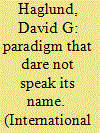

|
|
|
|
|
| Summary/Abstract |
This article examines the place that “realism” occupies in the debates over International Relations theory and Canadian Foreign Policy. Argued here is the claim that realism is far from being a dominant paradigm in the Canadian academy, which in itself is hardly a surprising finding. However, realism’s relative absence from the scholarship on Canadian Foreign Policy disguises a more important finding: there has been a fairly longstanding Canadian approach to foreign policy analysis bearing many of the hallmarks of structural-realist formulations, an approach that puts great emphasis on Canada’s “relative capability” as a “middle power” in the international system. Although few in the country would embrace the realist label explicitly, many have heeded the structural-realist injunction that foreign policy analysis should start with an assessment of the country’s relative standing in the international pecking order. In the Canadian case, this empirical emphasis on relative capability has become suffused with normative significance of a decidedly “non-realist” kidney, summed up in the disputed concept “middlepowermanship.” The article concludes that, to the extent realism is to continue to be a presence in Canadian Foreign Policy scholarship, it will likely be the non-structural variant known today as “neoclassical realism,” in no small measure due to the logical inconsistencies of the earlier, structuralist, paradigm.
|
|
|
|
|
|
|
|
|
|
|
|
|
|
|
|
| 17 |
ID:
081326


|
|
|
|
|
| Publication |
2008.
|
| Summary/Abstract |
This article takes a critical look at the established wisdom regarding the early twentieth century dispute between Canada and the United States over the contours of the Alaska Panhandle. In Canada, the affair is commonly recollected as having featured a sinister combination of American nationalist bullying and duplicitous British diplomacy. The result, according to a Canadian nationalist mythology that resonates to this day, is that Canada was effectively "sacrificed" by Britain at the altar of American territorial acquisitiveness. The reality, as argued in this article, is radically different from the mythology. Far from having "sold out" Canada, Britain was instrumental in securing for it a reasonably generous settlement on the part of an American administration that showed itself prepared to countenance the actual shrinkage of US territory. Rather than being motivated by a politics of bullying, the administration of Theodore Roosevelt was driven by diplomacy of honour
|
|
|
|
|
|
|
|
|
|
|
|
|
|
|
|
| 18 |
ID:
132875
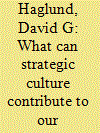

|
|
|
|
|
| Publication |
2014.
|
| Summary/Abstract |
This article reflects on application of the concept of strategic culture to supply analytical and policy-relevant guidance to those who ponder the future of security relations in the Asia-Pacific. Argued here is that, notwithstanding some obvious problems with the concept, there is utility in the application of strategic culture to the analysis of regional security challenges. To claim that strategic culture may not be equally applicable to all states in the Asia-Pacific region is not the same as saying it has no applicability at all, especially if the states to which it is applicable are important regional actors. This article suggests that both an old approach derivative of national character, and a new one associated with path dependence, might together prove fruitful for policy analysts and policy-makers alike, as they wrestle with what many assume to be the fundamental question of the coming half-century in the Asia-Pacific, namely whether a great power war in the region can be averted. Although there is much variation in the manner with which authors apply the master concept of strategic culture to their specific Asia-Pacific cases, each takes seriously the utility of a cultural approach to national strategic choice. So while the quest for reliable causality and predictive capability on a region-wide basis may remain that of the will-o'-the-wisp, there can be no gainsaying that, on a case-by-case basis, the authors show that the approach can demonstrate valuable insights into the policy dilemmas of cultural provenance and content confronting the Asia-Pacific.
|
|
|
|
|
|
|
|
|
|
|
|
|
|
|
|
| 19 |
ID:
058943
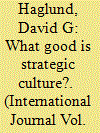

|
|
|
| 20 |
ID:
002639


|
|
|
|
|
| Publication |
Kingston, Center for International Relations, 1992.
|
| Description |
29p.
|
| Series |
Center for International Relations occasional paper;44
|
|
|
|
|
|
|
|
|
|
|
|
Copies: C:1/I:0,R:0,Q:0
Circulation
| Accession# | Call# | Current Location | Status | Policy | Location |
| 034050 | 355.0310944/HAG 034050 | Main | On Shelf | General | |
|
|
|
|
|
|
|
|
|